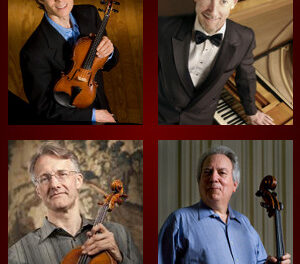The printed program proclaimed that it was Meredith College’s “Fall Choral Concert,” involving four separate groups in Jones Chapel. And you’d have to be mighty picky not to have found something to your liking. By one spectrum, the music ranged from an eighteenth century-style madrigal to “Pennies from Heaven.” A fine eight-voice group called Encore provided the former number. The latter involved all the massed singers, dubbed the Choral Union, as the closing feature of the evening. Chorale member and incipient jazz singing star Amanda Kessell launched this ending number in stylish fashion. Assisting the singers mightily here (and in the popular pieces by that same Encore group) were visiting players, bassist Erik Dyke and percussionist Dan Hall, with pianist Frank Pittman of the Meredith faculty.
Opening the evening were the Cantabile Singers, a group that rates special mention. These are not Meredith students, but singers from area middle schools and high schools. They rehearse at Meredith, directed by faculty member Fran Page. The precision and discipline of this group, some forty strong, rose to a level seldom witnessed (or heard). They performed without score, and hence, were able to concentrate solely on the director, all the while remaining totally devoid of distracting quirks and mannerisms. Probably their most pleasing offering was “The World Is Full of Poetry,” a somewhat impressionistic piece by David Brunner. Cantabile member Alyssa Montgomery’s oboe (as can no other instrument) helped promote the dreamy mood.
Lisa Fredenburgh provided effective and energetic direction for the other ensembles. The offerings of the sixteen-voice Meredith College Chorus included “The Cloths of Heaven” by Eleanor Daley. This romantic work was particularly charming, with Pittman’s piano so prominent as to make one think of a piano solo with choral accompaniment. Except for a couple of muddy lines in the middle of the text, the enunciation was crisp. The hearer was clearly enjoined to “Tread softly because you tread on my dreams.” The familiar “Torna a Surriento” was an audience favorite, although most members probably recalled the more anglicized “Return to Sorrento.” Violinist Margaret Garriss and cellist Jim Waddelow helped to establish the mood of sunny Italy.
The thirty-voice Meredith College Chorale furnished largely “serious” pieces, such as Chesnokov’s “Spaseniye Sodelal.” This traditional Russian anthem is better known by its opening line, “Salvation is created….” This challenging work was well handled a cappella, with its floating highs and grinding lows. Also included by this group was a fine rendition of the famous “Gott ist mein Hirt” (“The Lord Is My Shepherd”) by Schubert, and a treatment of “Ave Maria” by William Hawley.
Herein are discussed only a subset of the fourteen separate numbers presented during the evening – pieces as varied as “Salve Regina,” “Colcannon,” and “Give Me the Simple Life.” With this program the Department of Music and the Meredith Center for Women in the Arts have assured the sizable audience that choral music at that institution is in good order.











